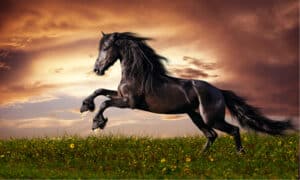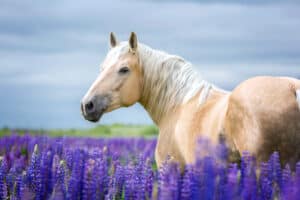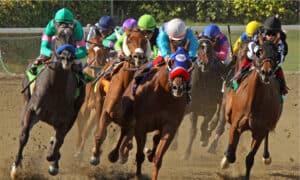Horses have a sensitive digestive system that is best suited for a plant-based diet. A horse who eats toxic or even unfamiliar foods might develop immediate or long-term health problems from it. But before we go over our list of the most poisonous plants to horses, let’s answer three common questions you might have about them.
Do Horses Know Not to Eat Poisonous Plants?
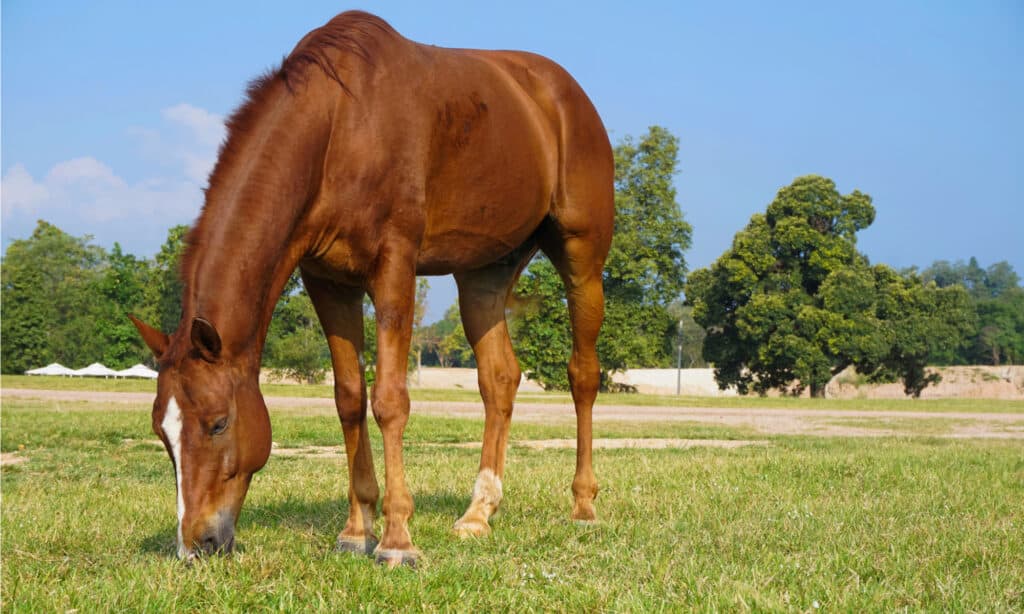
A horse’s diet consists of grass, hay, and grain. If they eat a poisonous plant, that spells trouble!
©Wynn Dhyana/Shutterstock.com
The plants, weeds, or flowers that are poisonous to horses will taste bitter. However, even though horses know better than to eat food that’s toxic to them, ingestion can often happen by mistake or because of a lack of access to enough appropriate forage.
You could also accidentally give your horse toxic food without knowing it! To avoid this, check out some of the most common foods we eat that are known to be harmful to horses.
What Are the Signs of a Horse Being Poisoned?
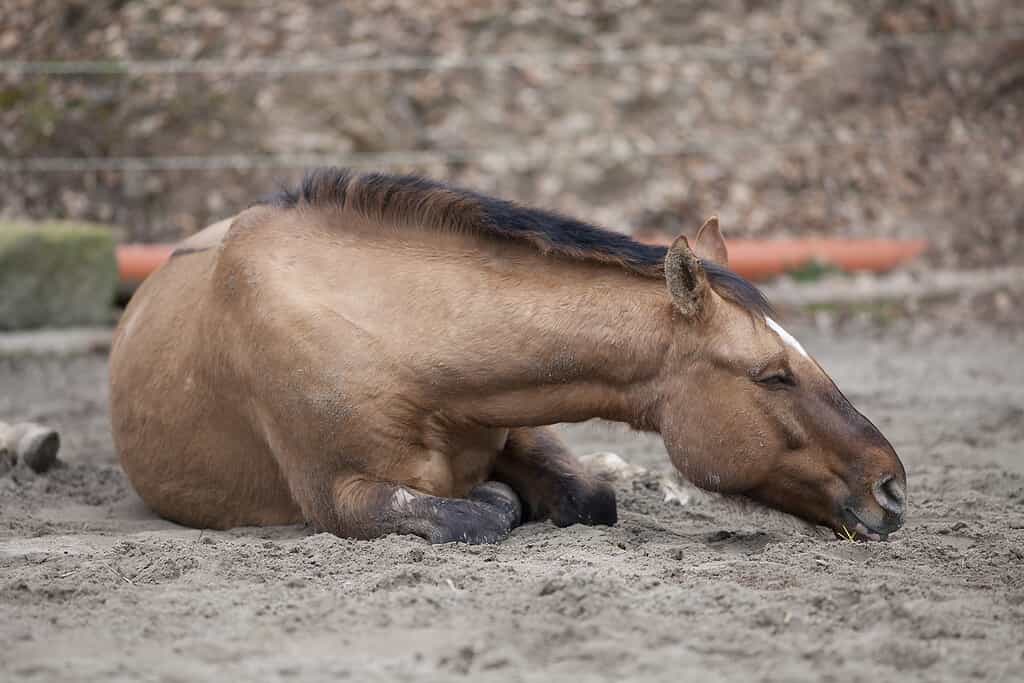
Horses that eat poisonous plants often show signs and symptoms right away.
©anjajuli/iStock via Getty Images
Depending on the type of plant ingested, your horse might have a variety of different symptoms that point to poisoning. Symptoms that signal a larger problem include:
- Sudden changes to their diet, behavior, or mood
- Lethargy
- Drooping lips or facial features
- Difficulty breathing
- Stiff joints
- Arrhythmia
- Sweating
For example, a horse not eating their breakfast and rolling excessively in the pasture tells you an episode of colic might be on the horizon. But colic is often a symptom, not a diagnosis, and could be a sign your horse ate something they shouldn’t have.
What to Do if You Think Your Horse Was Poisoned
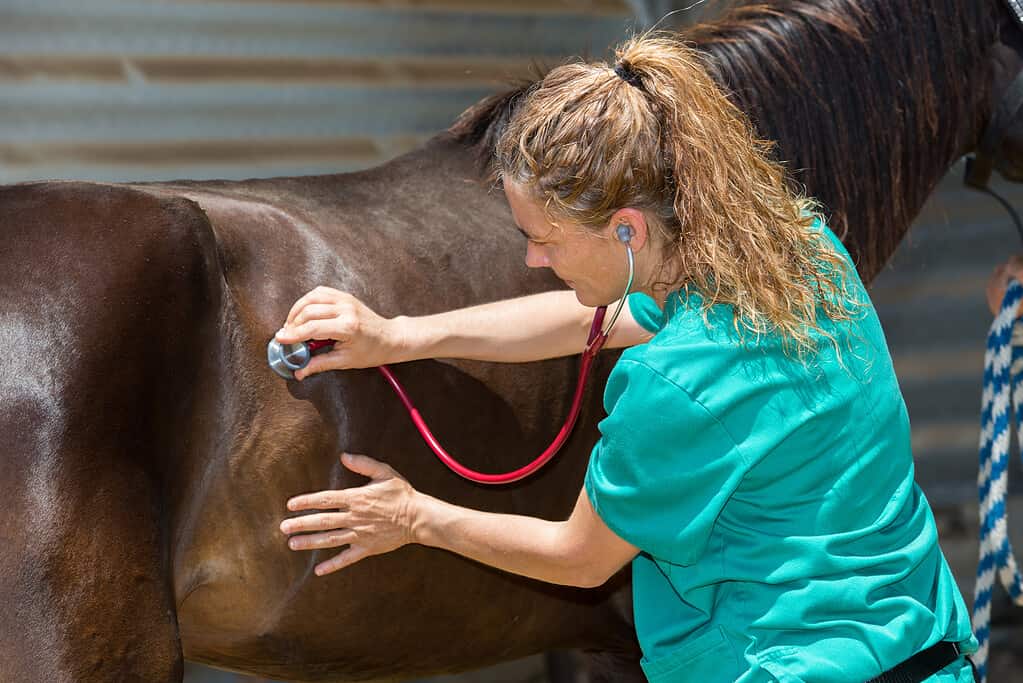
Call your veterinarian as soon as you notice a problem with your horse.
©iStock.com/fotoedu
It’s important to be attentive to your horse so you notice the signs much more quickly if something’s wrong. If you recognize a problem, call your veterinarian immediately.
To better understand what’s going on with your horse, they might ask you questions over the phone before they arrive. The questions will be related to their current symptoms, temperature, digestive sounds, recent bowel movements, and changes to their daily routine. Be as detailed as possible so they have a clear grasp of the situation.
Do you feel better now that you know what to look out for and what to do if you notice your horse ate something toxic? Good! Because it’s time to go over the plants that take the top spots for most poisonous to horses. They are the ones you (and your horse) want to avoid if a visit from the vet isn’t on your to-do list.
The 14 Most Poisonous Plants To Horses
There are a surprising number of plants that are poisonous to horses. Especially considering they live outside and forage for food all day long. To prevent your horse from ingesting anything toxic while they graze, check your pastures for these common and incredibly harmful plants.
1. Yellow Starthistle
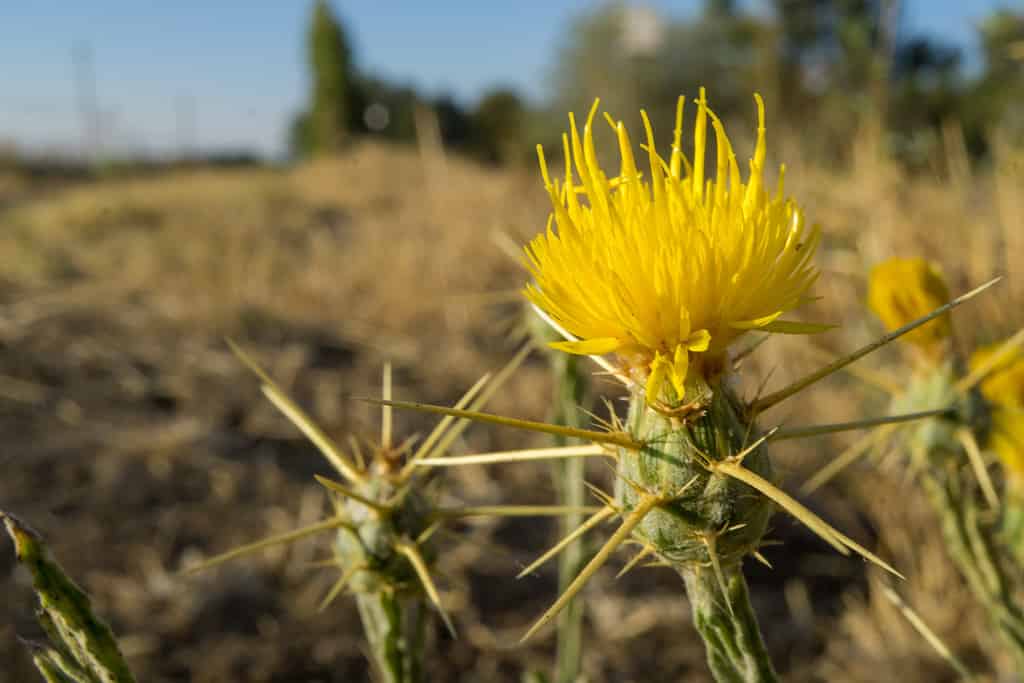
Keep your horses away from yellow starthistle! It’s highly poisonous and can be fatal to horses that ingest it.
©RelentlessImages/Shutterstock.com
The most poisonous plant to horses is yellow starthistle. This deceivingly beautiful flower causes permanent, untreatable brain damage. Horses who ingest this lose the ability to chew or drink. Over time, this leads to starvation. Yellow starthistle is most prominent in Colorado, so take extra precautions if you live there.
2. Russian Knapweed
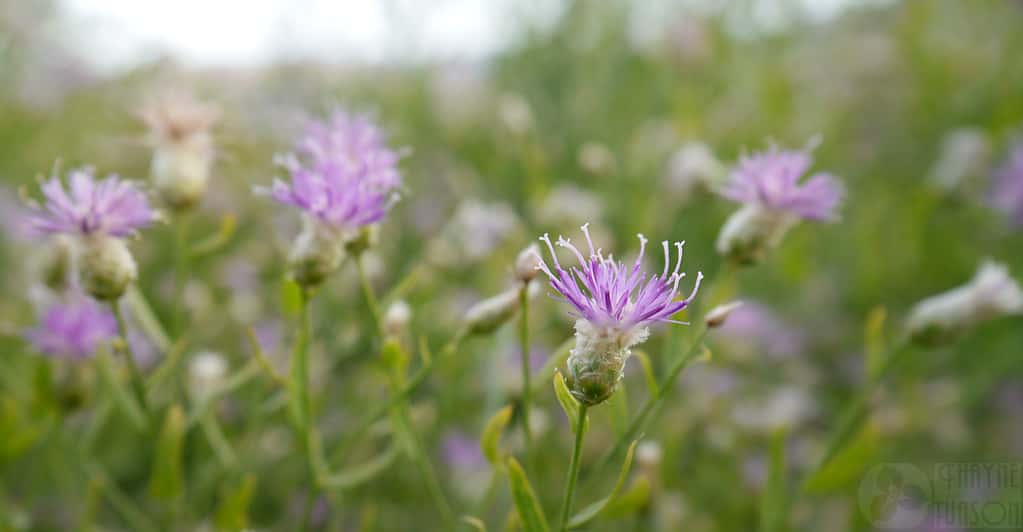
The
Rhaponticum repensor Russian knapweed is not a plant you want in your pasture.
©Thayne Tuason, CC BY-SA 4.0, via Wikimedia Commons – License
Another plant that causes damage to a horse’s brain and central nervous system is Russian knapweed. Ingestion results in “chewing disease,” which is irreversible. The horse loses the ability to eat, drink, or swallow until its eventual death.
3. Oleander
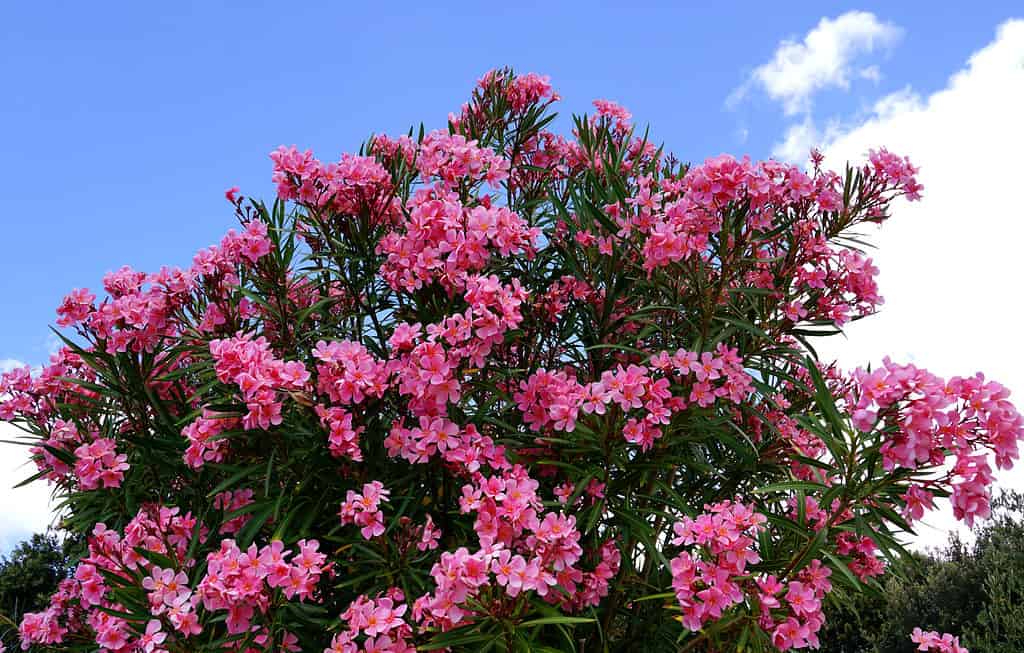
The oleander plant is highly lethal yet deceivingly beautiful.
©Happy window/Shutterstock.com
If you watched The Saddle Club in the 90s, you’ll know just how dangerous oleander can be if your horse gets a bite of it. This plant contains a compound that affects horse’s hearts, which can cause arrhythmia or cardiac arrest in even minuscule doses. For context, 1 ounce of oleander leaves is lethal to the average 1,000-pound horse.
4. Nightshades
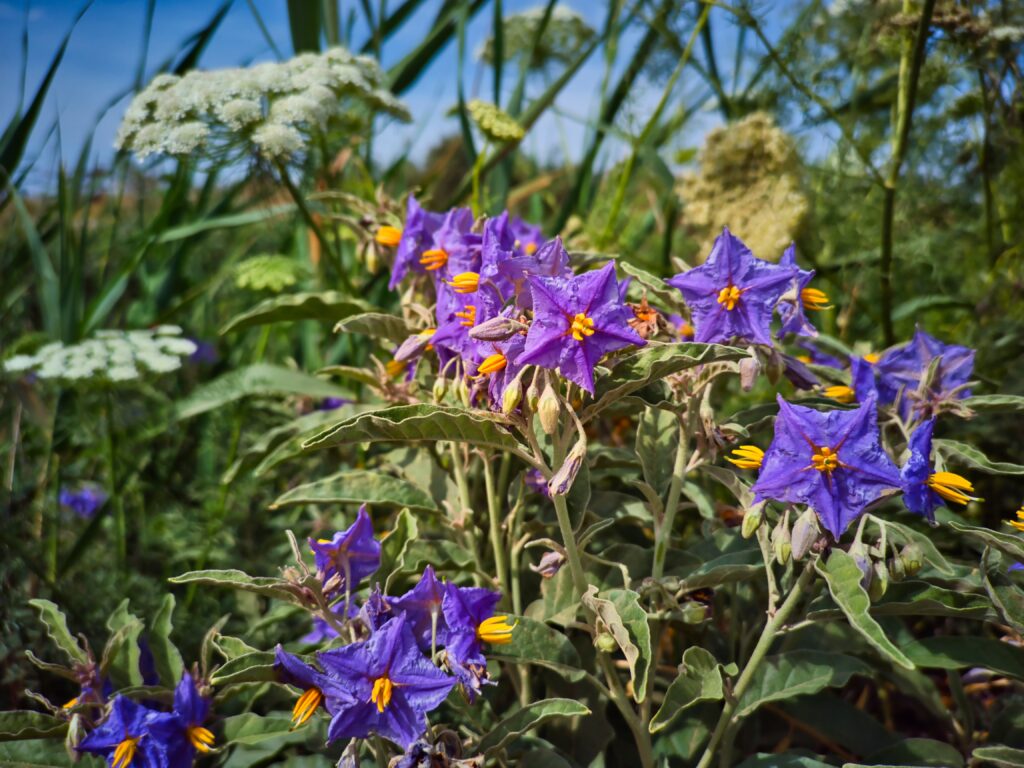
The flowers of the silverleaf nightshade plant have five petals that unite, making the flowers look like stars.
©ervin herman/Shutterstock.com
The nightshade family contains a plethora of plants poisonous to horses. This includes horse nettle, ground cherry, tomatoes, and potatoes. The solanine in nightshades has a disastrous effect on a horse’s nervous and digestive system. A lethal dose is close to 10 pounds, but symptoms can present if even one pound is ingested.
5. Hoary Alyssum
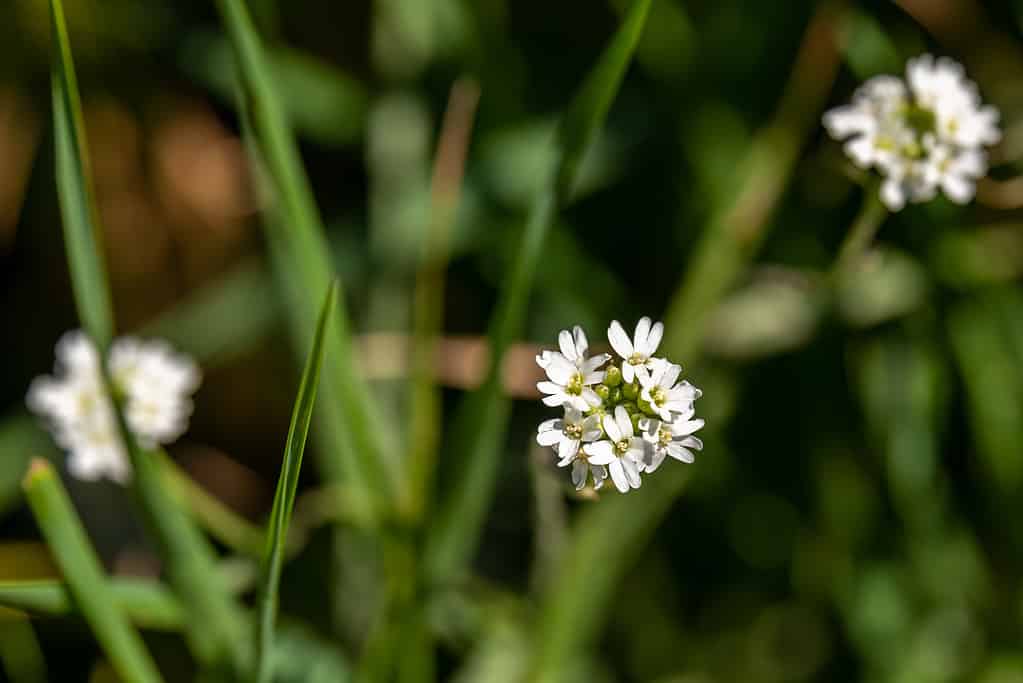
Hoary alyssum can sometimes be found in the hay horses forage on and can cause swelling in their legs if ingested.
©Barbara Gabay/iStock via Getty Images
Your horse doesn’t just find toxic plants in their pasture. Sometimes, the hay they forage on contains hoary alyssum. You can tell if they ingested this plant if their legs swell, they develop a fever and are unwilling to move. Call your veterinarian immediately if you notice these signs.
6. Yew
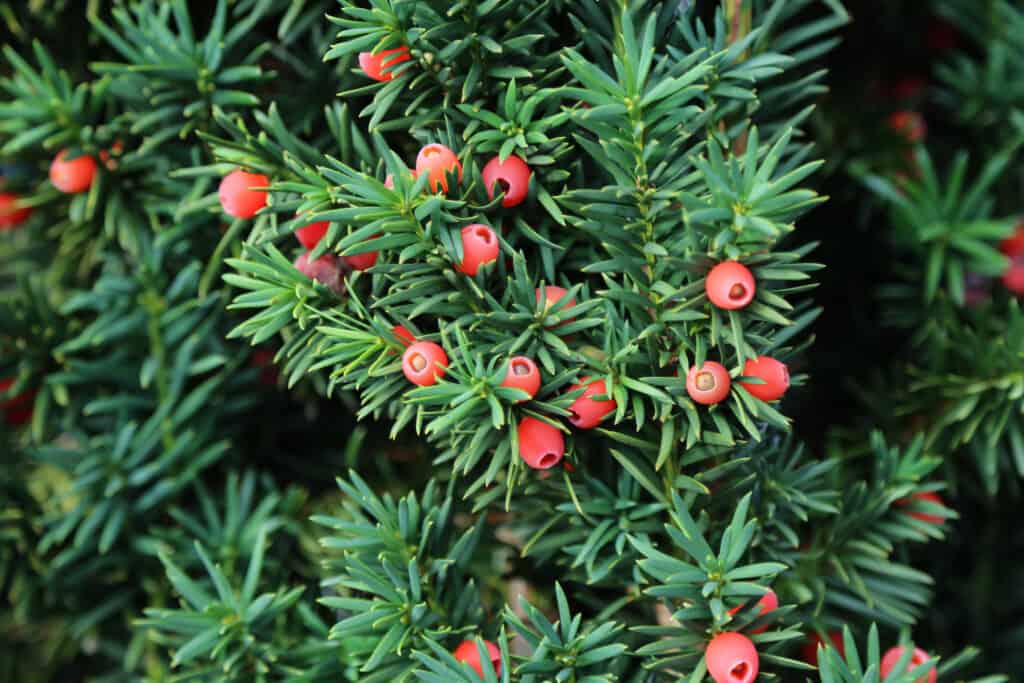
Yew trees are known for growing relatively slowly and living a long time but can cut your horse’s life short if they ingest the needles.
©iStock.com/Leo Malsam
While most of the plants on our list have a bitter taste, your horse can still ingest them accidentally or if they don’t have enough access to the right forage. Here’s why that’s a problem with the yew plant. The taxine in yew makes 0.5 pounds of yew needles lethal for the average 1,000-pound horse.
7. Foxglove
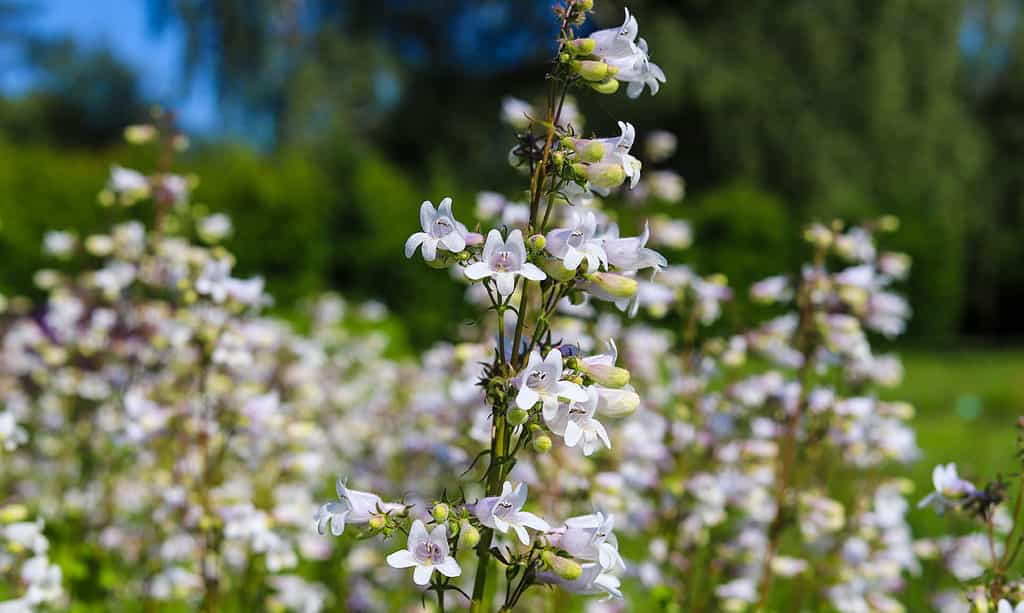
The white beard-tongue, also called foxglove beard-tongue, is poisonous to horses.
©Kabar/Shutterstock.com
Foxgloves are one of the more dangerous plants for horses. That’s because it hits their cardiovascular, digestive, and neurological systems at once. Ingesting this plant can lead to death after just a few hours if treatment isn’t started.
8. Castor Bean
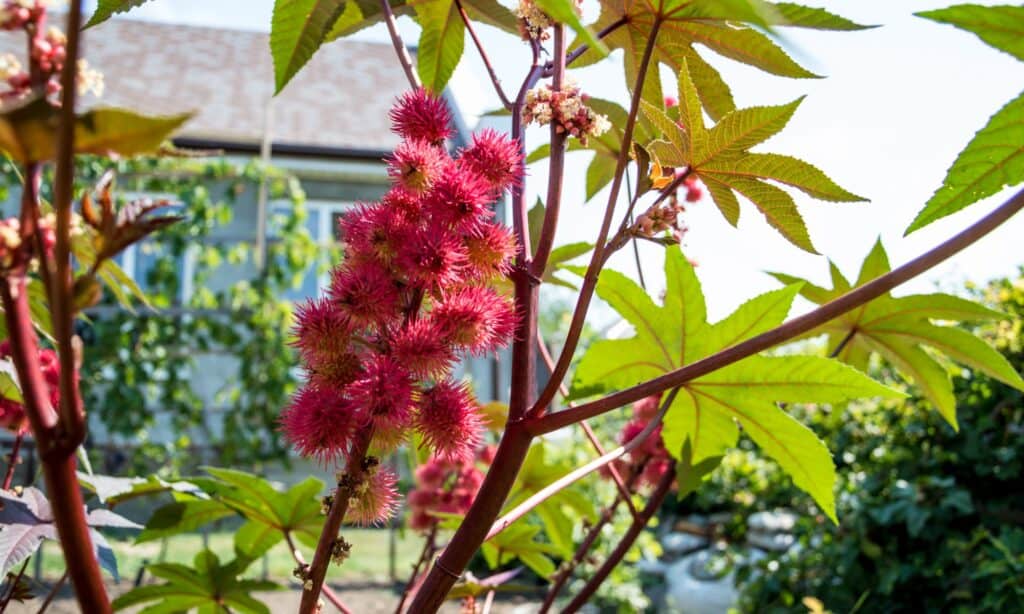
The brightly-colored castor bean plant contains a substance that’s highly toxic to horses.
©iStock.com/NATALIA NOSOVA
The castor bean or caster oil plant is high in ricin. This substance is poisonous to horses in even low doses. Symptoms appear between 12 and 48 hours after the plant is ingested. The toxicity level is high — <1 ounce of seeds can be deadly.
9. Hemlock (Poison and Water)
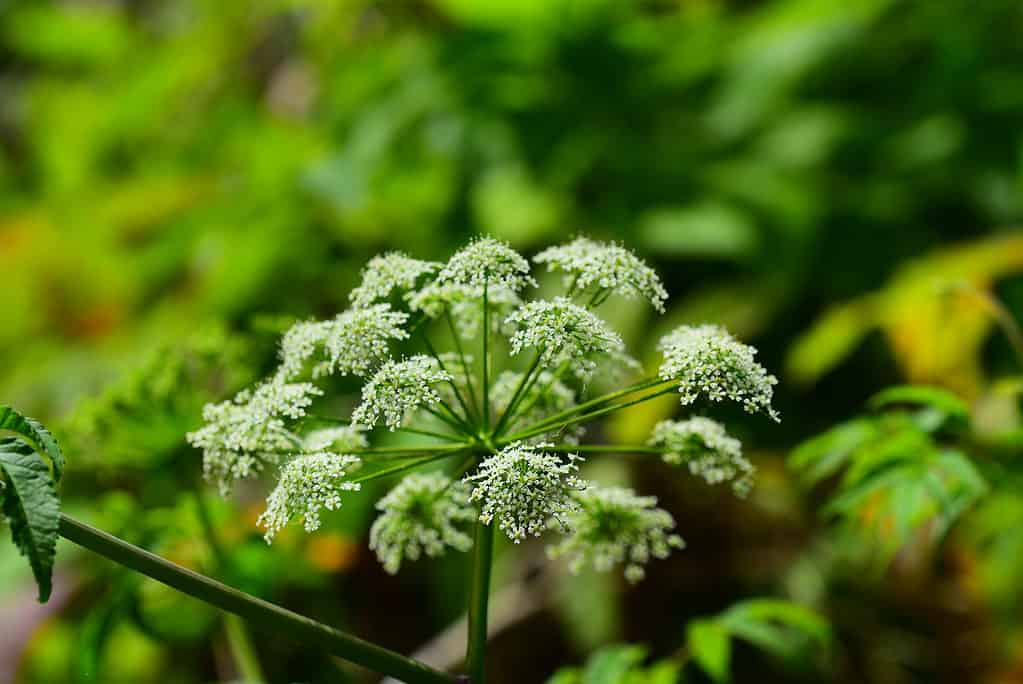
Each flower head on the water hemlock plant is composed of clusters of small, five-petaled white flowers.
©iStock.com/cturtletrax
It’s in the name, literally. All parts of the hemlock plant are poisonous to horses. If they eat just four pounds of it, respiratory failure and sudden death often follow.
10. Bracken Fern
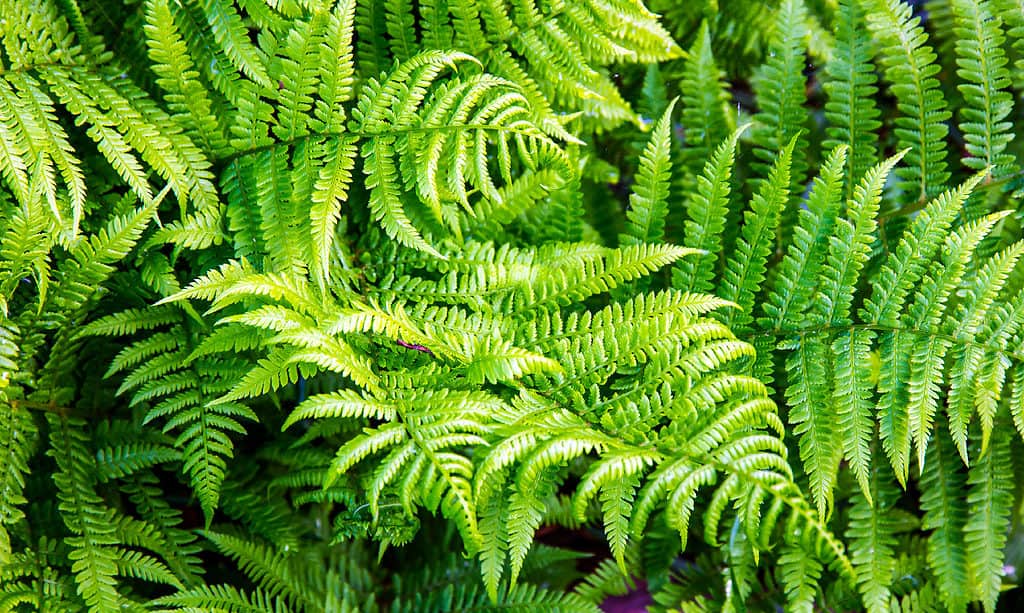
The bracken fern, native to North America and Eurasia, is a toxic species for horses.
©iStock.com/troyka
The neurological damage that presents with symptoms over the course of a week is a sign of poisoning from a bracken fern. Thiaminase, a compound in this plant, causes vitamin B1 deficiency. Your veterinarian will treat with thiamine to restore the vitamins lost.
11. Tansy Ragwort
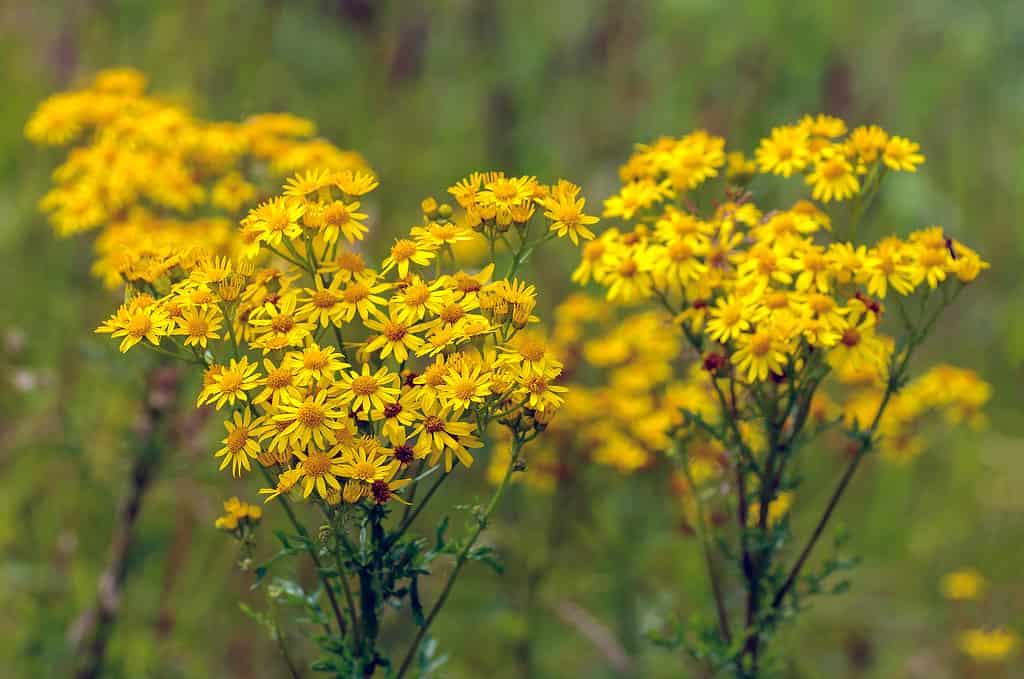
Often found in pastures or along roadsides, tansy ragwort can be a deadly plant to horses.
©RuudMorijn/iStock via Getty Images
This is one of the more deadly plants for horses to ingest because symptoms of toxicity don’t present until it’s too late for a positive prognosis. Tansy ragwort grows along the roadside and in pastures, so be careful when riding or letting your horse out to graze.
12. Trees (Maple, Oak, and Sycamore)
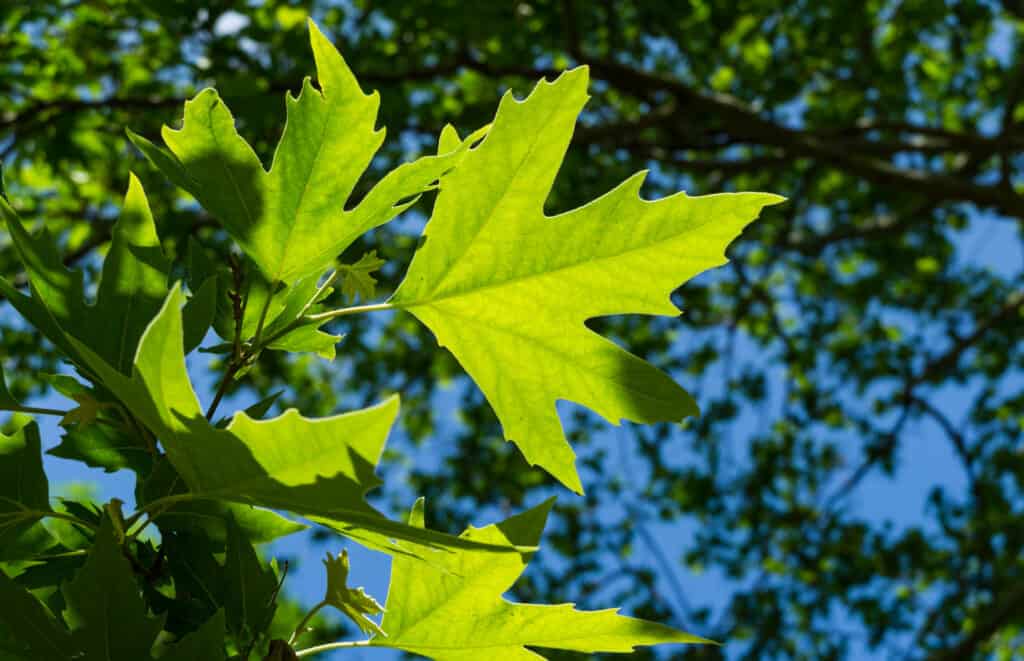
Young fluffy green leaves on a sycamore tree are poisonous to horses if they ingest enough of them.
©iStock.com/Marina Denisenko
The seeds of a sycamore produce hypoglycin-A, which is fatal if horses ingest it. Additionally, the acorns that fall from oak trees are dangerous to horses because they are quite tasty to them! if you can avoid it, don’t fence in a pasture with these kinds of trees in it. If so, watch out for potential signs of poisoning.
13. Field Horsetail
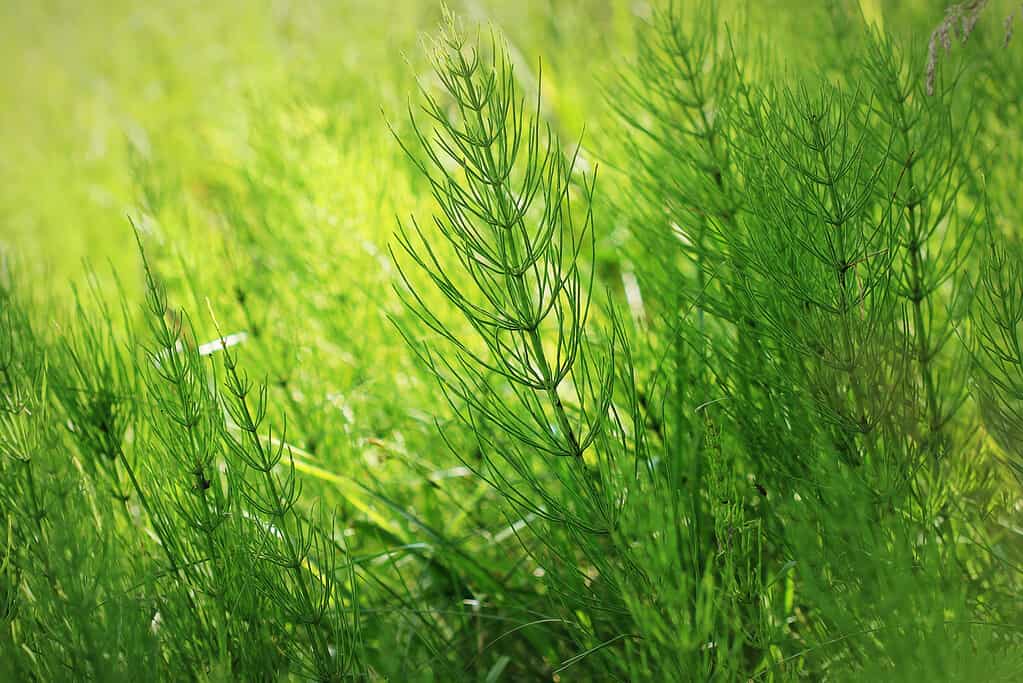
Another unassuming, yet highly toxic plant to watch out for? Field horsetail.
©Vaivirga/iStock via Getty Images
The toxic effects of the field horsetail plant are similar to bracken ferns. That’s because they both contain thiaminase, which is lethal to horses. Treatment involves restoring the vitamin B1 deficiency and removing either the plant or the horse from the pasture.
14. Milkweed
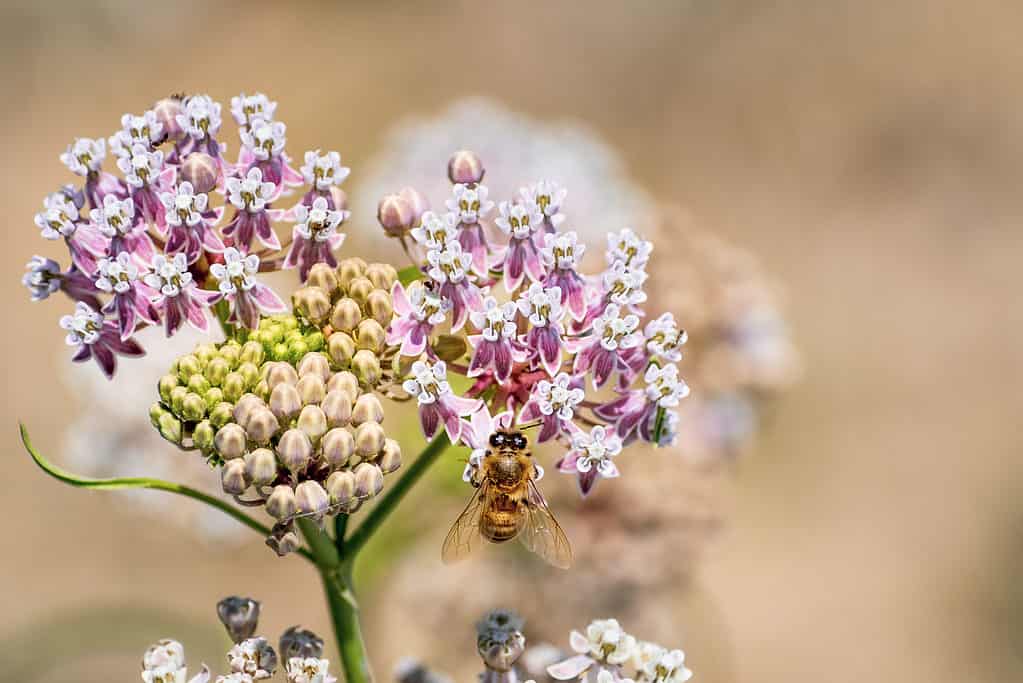
Narrow-leaf milkweed is beneficial for certain insects but toxic to horses.
©iStock.com/Sundry Photography
One animal’s lifeline is another’s death sentence. Milkweed is food for butterfly larvae but it’s incredibly poisonous to horses! This plant made the list because it can wind up in your horse’s hay if you’re not careful. Signs to look out for include weakness, difficulty breathing, and an irregular pulse.
Remember to consult your veterinarian immediately if you notice changes in your horse’s diet, behavior, or mood. If the diagnosis isn’t obvious, the symptoms could be due to accidental poisoning! Act swiftly and early to ensure the best outcome for your horse.
The photo featured at the top of this post is © iStock.com/Katrin_Timoff
Thank you for reading! Have some feedback for us? Contact the AZ Animals editorial team.



